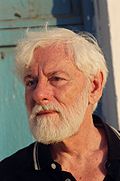Not bad for a chicken, even for one with a full set of feathers.
His emergence as a leader on the world stage is somewhat reminiscent of Anwar Sadat.
When Gamal Abd-al-Nasser unexpectedly died at the age of 52 in 1970 and his official deputy, Sadat, assumed his mantle, all political experts shrugged.
Sadat? Who the hell is that? He was considered a nonentity, an eternal No. 2, one of the least important members of the group of "free officers" that was ruling Egypt.
In Egypt, a land of jokes and jokers, witticisms about him abounded. One concerned the prominent brown mark on his forehead. The official version was that it was the result of much praying, hitting the ground with his forehead. But the real reason, it was told, was that at meetings, after everyone else had spoken, Sadat would get up and try to say something. Nasser would good-naturedly put his finger to his forehead, push him gently down and say: "Sit, Anwar!"
To the utter amazement of the experts -- and especially the Israeli ones -- this "nonentity" took a huge gamble by starting the 1973 October War, and proceeded to do something unprecedented in history: going to the capital of an enemy country still officially in a state of war and making peace.
Abbas' status under Yasser Arafat was not unlike Sadat's under Nasser. However, Arafat never appointed a deputy. Abbas was one of a group of four or five likely successors. The heir would surely have been Abu Jihad, had he not been killed by Israeli commandos in front of his wife and children. Another likely candidate, Abu Iyad, was killed by Palestinian terrorists. Abu Mazen (Abbas) was in a way the choice by default.
Such politicians, emerging suddenly from under the shadow of a great leader, generally fall into one of two categories: the eternal frustrated No. 2 or the surprising new leader.
The Bible gives us examples of both kinds. The first was Rehoboam, the son and heir of the great King Solomon, who told his people: "my father chastised you with whips, but I will chastise you with scorpions." The other kind was represented by Joshua, the heir of Moses. He was no second Moses, but according to the story a great conqueror in his own right.
Modern history tells the sad story of Anthony Eden, the long-suffering No. 2 of Winston Churchill, who commanded little respect. (Mussolini called him, after their first meeting, "a well-tailored idiot."). Upon assuming power, he tried desperately to equal Churchill and soon embroiled Britain in the 1956 Suez disaster. To the second category belonged Harry Truman, the nobody who succeeded the great Franklin Delano Roosevelt and surprised everybody as a resolute leader.
Abbas looked like belonging to the first kind. Now, suddenly, he is revealed as belonging to the second. The world is treating him with newfound respect. Nearing the end of his career, he made the big gamble.
BUT WAS it wise? Courageous, yes. Daring, yes. But wise?
My answer is: Yes, it was.
Abbas has placed the quest for Palestinian freedom squarely on the international table. For more than a week, Palestine has been the center of international attention. Scores of international statesmen and women, including the leader of the world's only superpower, have been busy with Palestine.
For a national movement, that is of the utmost importance. Cynics may ask: "So what did they gain from it?" But cynics are fools. A liberation movement gains from the very fact that the world pays attention, that the media grapple with the problem, that people of conscience all over the world are aroused. It strengthens morale at home and brings the struggle a step nearer its goal.
Oppression shuns the limelight. Occupation, settlements, ethnic cleansing thrive in the shadows. It is the oppressed who need the light of day. Abbas' move provided it, at least for the time being.
(Note: You can view every article as one long page if you sign up as an Advocate Member, or higher).





